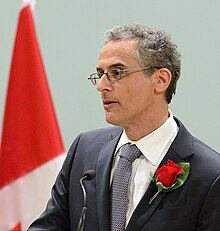
Bertil Gotthard Ohlin was a Swedish economist and politician. He was a professor of economics at the Stockholm School of Economics from 1929 to 1965. He was also leader of the People's Party, a social-liberal party which at the time was the largest party in opposition to the governing Social Democratic Party, from 1944 to 1967. He served briefly as Minister of Commerce and Industry from 1944 to 1945 in the Swedish coalition government during World War II. He was President of the Nordic Council in 1959 and 1964.

The Stockholm School is a school of economic thought. It refers to a loosely organized group of Swedish economists that worked together, in Stockholm, Sweden primarily in the 1930s.

Andrew Michael Spence is a Canadian-American economist and Nobel laureate.

Paul Robin Krugman is an American economist who is the Distinguished Professor of Economics at the Graduate Center of the City University of New York. He wrote as a columnist for The New York Times from 2000 to 2024. In 2008, Krugman was the sole winner of the Nobel Memorial Prize in Economic Sciences for his contributions to new trade theory and new economic geography. The Prize Committee cited Krugman's work explaining the patterns of international trade and the geographic distribution of economic activity, by examining the effects of economies of scale and of consumer preferences for diverse goods and services.
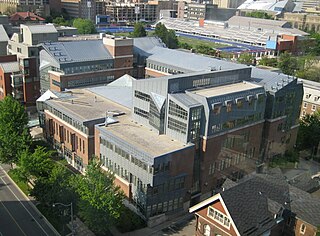
The Joseph L. Rotman School of Management is the University of Toronto's graduate business school, located in Downtown Toronto. The University of Toronto has been offering undergraduate courses in commerce and management since 1901, but the business school was formally established in 1950 as the Institute of Business Administration. The name was changed to the Faculty of Management Studies in 1972 and subsequently shortened to the Faculty of Management in 1986. The school was renamed in 1997 after Joseph L. Rotman (1935–2015), its principal benefactor.
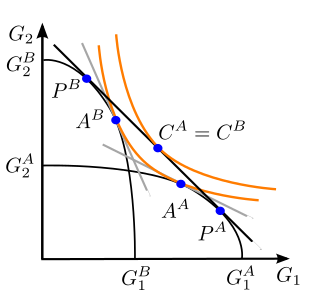
The Heckscher–Ohlin model is a general equilibrium mathematical model of international trade, developed by Eli Heckscher and Bertil Ohlin at the Stockholm School of Economics. It builds on David Ricardo's theory of comparative advantage by predicting patterns of commerce and production based on the resources of a trading region. The model essentially says that countries export the products which use their relatively abundant and cheap factors of production, and import the products which use the countries' relatively scarce factors.
Joseph Louis Rotman was a Canadian businessman and philanthropist. Rotman was the founder, benefactor and member of organizations such as the Clairvest Group Inc., the Rotman Research Institute, the Rotman School of Management, and the Rotman Institute of Philosophy. Throughout his life, he received three honorary degrees, as well as an induction into the Canadian Business Hall of Fame. He is well-regarded for donating his time and financial assistance to numerous philanthropic causes including the arts, education and healthcare.

Erik Brynjolfsson is an American academic, author and inventor. He is the Jerry Yang and Akiko Yamazaki Professor and a Senior Fellow at Stanford University where he directs the Digital Economy Lab at the Stanford Institute for Human-Centered AI, with appointments at SIEPR, the Stanford Department of Economics and the Stanford Graduate School of Business. He is also a research associate at the National Bureau of Economic Research and a best-selling author of several books. From 1990 to 2020, he was a professor at MIT.

Richard Barry Freeman is an economist. The Herbert Ascherman Professor of Economics at Harvard University and Co-Director of the Labor and Worklife Program at Harvard Law School, Freeman is also Senior Research Fellow on Labour Markets at the Centre for Economic Performance, part of the London School of Economics, funded by the Economic and Social Research Council, the UK's public body funding social science. Freeman directs the Science and Engineering Workforce Project (SEWP) at the National Bureau of Economic Research (NBER), a network focused on the economics of science, technical, engineering, and IT labor which has received major long-term support from the Sloan Foundation.
In economics, the Leontief's paradox is that a country with a higher capital per worker has a lower capital/labor ratio in exports than in imports.
Michael J. Trebilcock is a New Zealand-born, Canadian-based law academic. He is currently distinguished university professor and professor of law at the University of Toronto, specializing in law and economics.
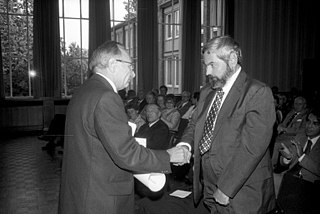
Harry Gordon Johnson, was a Canadian economist who studied topics such as international trade and international finance.
Andrew Barnes Bernard is an American economist, currently the Kadas T'90 Distinguished Professor at the Tuck School of Business at Dartmouth College in Hanover, New Hampshire, United States. He has been on the faculty at Tuck since 1999. He received his A.B. from Harvard and his Ph.D. from Stanford University in economics in 1991 and was on the faculty at MIT and Yale School of Management prior to coming to Tuck.
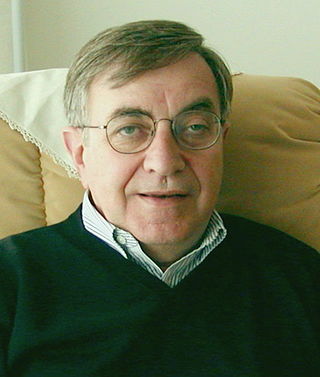
Elhanan Helpman is an Israeli economist who is currently the Galen L. Stone Professor of International Trade at Harvard University. He is also a Professor Emeritus at the Eitan Berglas School of Economics at Tel Aviv University. Helpman is among the thirty most cited economists in the world according to IDEAS/RePEc.
John Michael Van Reenen OBE is the Ronald Coase School Professor at the London School of Economics. He is also Director of the Programme On Innovation and Diffusion (POID) at the Centre for Economic Performance. He was appointed an Officer of the Order of the British Empire (OBE) and received the Yrjö Jahnsson Award. He was appointed as Chair of the Council of Economic Advisors to the UK Chancellor of the Exchequer, Rachel Reeves, on 5 July 2024.
Pol Antràs Puchal is a Catalan economist who has served as the Robert G. Ory Professor of Economics at Harvard University since 2015.

Michael Scott Taylor is a Canadian economist, who studies the interaction between international trade and environmental outcomes. He is currently the Canada Research Chair in International, Energy and Environmental Economics at the University of Calgary, a research associate at the National Bureau of Economic Research, and a Fellow of the Beijer Institute of Ecological Economics. He is also the recipient of an honorary doctorate from the University of Basel (2010). In 2014, Scott Taylor was named fellow to the Royal Society of Canada (RSC).

The School of Public Policy is a Canadian government-funded think tank based at the University of Calgary located in Calgary, Alberta, Canada.

Ludger Wößmann is a German economist and professor of economics at the Ludwig Maximilian University of Munich (LMU). Moreover, being one of the world's foremost education economists, he is the director of the ifo Center for the Economics of Education at the ifo Institute. Beyond the economics of education, his research interests also include economic growth and economic history. In 2014, Wößmann's empirical research on the effects of education and his corresponding contribution to public debate were awarded the Gossen Prize, followed by the Gustav Stolper Prize in 2017.
Robert Christopher Feenstra is an American economist, academic and author. He is the C. Bryan Cameron Distinguished Chair in International Economics at University of California, Davis. He served as the director of the International Trade and Investment Program at the National Bureau of Economic Research from 1992 to 2016. He also served as Associate Dean in the Social Sciences at the University of California, Davis from 2014 to 2019.
